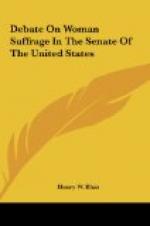No audiences could have been more thoroughly representative of the people; and as we held one (and more) convention in each Congressional district in the State, we certainly had, from the votes of those audiences in eleven cities, a truthful expression of the feeling of the people of the State of Kansas on this question. Many of the friends of the cause here are very willing to risk our fate to the popular vote.
In our conventions Miss Anthony
was in the habit of putting the
following questions to vote:
“Are you in favor of equal suffrage for women?”
“Do you desire that
your Senators, INGALLS and PLUMB, and your
seven Congressmen shall vote
for the sixteenth amendment to the
Federal Constitution?”
and
“Do you desire your
Legislature to extend municipal suffrage to
women?”
In response there always came
a rousing “yes,” except when the
vote was a rising one, and
then the house rose in a solid body.
Miss Anthony’s call
for the negative vote was answered by silence.
Petitions for municipal suffrage in Kansas are rolling up enormously. People sign them now who refused to do so last year. I tell you it is catching. Many people here are disgusted with our asking for such a modicum as municipal suffrage, and say they would rather sign a petition asking for the submission of an amendment to our State constitution giving us State suffrage. We have speakers now at work all over the State, their audiences and reception are enthusiastic, and their most radical utterances in favor of woman are the most kindly received and gain them the most applause.
And further to the same effect. I shall offer nothing more of that kind, but I have come in possession of some data bearing upon the question of the intellect of woman. The real objection seems to me to he that she does not know enough to vote; that it is the ignorant ballot that is dangerous; but that is a subject which of course I have no time to go into. However, I have some data collected very recently, and at my request, by a most intelligent gentleman of the State of Maine. Either of the Senators from that State will bear witness as to the high character of this gentleman, Mr. Jordan. He sent the data to me a few days ago. They show the relative standing of the two sexes in the high schools in the State of Maine where they are being educated together, and in one of the colleges of that State:
High school No. 1.—Average rank on scale of 100.—1882: boys 88.7, girls 91; 1883: boys 88.2, girls 91.3; 1884: boys 88.8, girls 91.9 (of the graduating class 7 girls and 1 boy were the eight highest in rank for the four years’ course); 1885: boys 88.6, girls 91.4 (eight highest in rank for four years’ course, 4 boys and 4 girls); 1886: boys 88.2, girls 91 (eight highest in rank for four years’ course, 7 girls and I boy).
High school No. 2.—Average
rank on scale of 100.—1886: boys
90, girls 98 (six highest
in rank for four years’ course, 6
girls).




